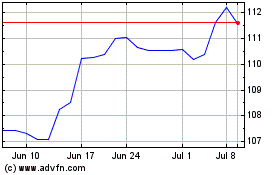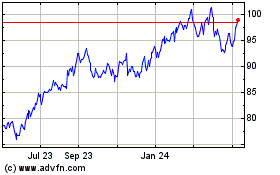By Suzanne Kapner
Americans are more value-conscious than they have been in
decades. And retailers offering good deals, from bargains on
brand-name goods to conveniences such as free shipping, are gaining
share at the expense of peers that have been slow to innovate.
Walmart Inc., Target Corp. and T.J. Maxx parent TJX Cos.
reported strong sales growth and an uptick in visitors to their
stores. But Macy's Inc., J.C. Penney Co. and Nordstrom Inc. are
among retailers that continue to struggle.
"The common thread among retailers that are doing well is that
they offer some type of value," said Chuck Grom, senior analyst at
Gordon Haskett Retail Advisors. "But, today, value is about more
than just price. It's also about convenience."
Convenience can take many forms. It can mean pulling into a
Walmart or T.J. Maxx parking lot and dashing into the store rather
than navigating through a shopping mall maze. It can also mean
free, two-day shipping, no minimum required, as Target offered last
holiday season.
On Wednesday, Target said sales at stores open at least a year
rose 3.4% for the three months ended Aug. 3, and upped its earnings
guidance for the current fiscal year.
Total revenue for the recent period increased 3.6% to $18.4
billion. Net earnings climbed to $938 million from $799 million a
year earlier.
A day earlier, TJX said sales at stores open at least a year
rose 2% in the most recent quarter, which was lower than some
analysts had expected, but on top of a 6% increase in the same
period a year ago. TJX CEO Ernie Herrman told analysts that
customer traffic to its stores drove the sales increase and that
foot traffic had grown for 20 consecutive quarters.
TJX stores rapidly turn over limited quantities of goods at
bargain prices. The result is a constant treasure hunt, with
shoppers coming back to ferret out deals. There is no glut of stock
in the backroom. Customers know if they don't buy it today, the
item might not be there tomorrow.
Kohl's, on the other hand, is suffering a similar fate to other
department stores even though it isn't located in malls and has
introduced services designed to draw shoppers to its stores. Under
a partnership with Amazon.com Inc., customers can return items
bought on Amazon to any of Kohl's more than 1,100 locations.
Nevertheless, Kohl's sales fell for the third consecutive
quarter in the most recent period, leaving it with excess
merchandise that it had to mark down, hurting profits.
More than a decade after the last recession, consumers still
remain "extremely focused on getting value for the dollar," said
Neil Saunders, a managing director of GlobalData PLC, a research
firm. "A lot of retailers haven't added that value, and consumers
are just going elsewhere."
The poor results from some chains can't be blamed on fears of an
oncoming recession. In July, retail sales increased at their
strongest level since March, giving the economy a boost.
"The consumer is still healthy," Macy's CEO Jeff Gennette said
in an interview last week.
Many other factors are upending traditional retailers, from the
rise in online shopping to higher rent. They also have to contend
with tariffs on goods imported from China and rising labor costs,
which have been eating into profits. Some chains are adapting
better than others.
Consumers' love affair with a good deal is also manifesting
itself in the rise of thrift shopping, which is poised to overtake
fast fashion in terms of annual sales within a decade.
"If off-price chains like T.J. Maxx wooed shoppers with promises
of 20% to 60% off regular retail prices, resale websites like
thredUP offer discounts of as much as 90% off," said Oliver Chen,
an analyst at Cowen & Co. "That is making it harder for
traditional retailers."
Macy's and Penney are jumping into the secondhand market. Both
announced partnerships last week with thredUP Inc. to sell used
clothing and accessories in some of their stores. Macy's has also
gotten into the off-price game by opening Macy's Backstage discount
stores, which compete with T.J. Maxx.
Department stores have been disproportionately hurt, because
their stores are in malls that are drawing less foot traffic, as
shoppers buy more online. Unlike Walmart and Target, which have
large grocery offerings to draw shoppers, department stores are
overly dependent on apparel that can be found almost everywhere,
making it easy for shoppers to compare prices online.
Macy's last week lowered its full-year earnings outlook after it
missed profit expectations, sending shares tumbling, while Penney
said sales at stores open at least a year fell 9%.
Analysts say these stores aren't doing enough to adapt to the
changes in consumer behavior.
"They are jumping on someone else's bandwagon, rather than
innovating," Mr. Saunders, of GlobalData, said. "They are playing
catch-up, and that's not good enough in retailing today."
Write to Suzanne Kapner at Suzanne.Kapner@wsj.com
(END) Dow Jones Newswires
August 21, 2019 07:15 ET (11:15 GMT)
Copyright (c) 2019 Dow Jones & Company, Inc.
TJX Companies (NYSE:TJX)
Historical Stock Chart
From Mar 2024 to Apr 2024

TJX Companies (NYSE:TJX)
Historical Stock Chart
From Apr 2023 to Apr 2024
